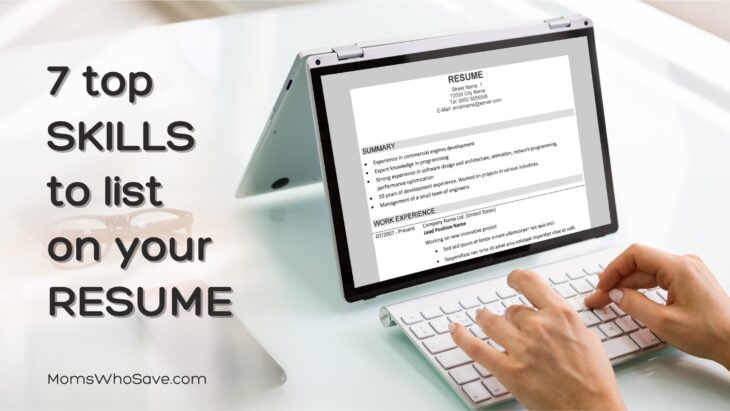Disclosure: Articles may contain affiliate links. As an Amazon Associate, we earn from qualifying purchases (at no additional cost to you). See our full disclosure here.
Are you actively looking for a new job or just want to keep your resume current in case the right position comes along? Then you’ll need know the most important skills to list on a resume–the ones potential employers are looking for and will make you stand out in the crowd.

Every resume should include a person’s education, experience, and skills. Skills include your theoretical knowledge and ability to work with software and/or tools to complete a professional task. In short, your skills determine how well you will be able to perform the tasks required as part of your job.
Some of the skills to list in your resume are universal, while others are strictly job-related. If you’re confused about which skills to add to your resume, check out the tips from our experts below.
Why Is the Skills Section Important?
A comprehensive skills section with relevant hard and soft skills shows your professional ability to exercise tasks effectively and on time.
Many employers will prioritize skills over experience, which is why most resume services will do their best to highlight your skills, especially if you’re a beginner or are changing professions.

How to decide which skills to list on a resume?
- Brainstorm your hard and soft skills, matching them to those the job or position demands. Which are the core skills one needs to succeed in your career? For instance, strong knowledge of dental procedures and techniques, the latest equipment, and dental protocols are vital skills for a dental hygienist.
- Think of relevancy. Is it still necessary to mention your knowledge of PASCAL or Coffee Script? Some tools and software, especially in the IT field, become out of date quickly, so it’s better to omit them from your resume.
- Explore the industry you’re planning to enter. For example, do you want to work in hospitality, a field that highly values interpersonal and communication skills, or in construction that values attention to detail and physical stamina?
If choosing skills to put on your resume seems difficult, choose ones from the list of universal skills below.

1. Teamwork
Most industries are seeking applicants who work well on a team, since most company activities happen in teams or departments. And, if you look at any company’s structure, you’ll find that the departments are also chained to each other, making them interdependent.
Therefore, if one department or team fails, other departments suffer as well. Meanwhile, great teamwork results in innovative ideas, reduced stress, better problem-solving, and increased productivity.
How to boost your teamwork skills?
- Practice active listening
- Make a decision after consulting with the team members
- Be the one to initiate brainstorming sessions
- Participate in team-building activities or organize them yourself
2. Communication Skills
This is similar to teamwork and is applicable to communication with the company’s clients and customers. Some jobs are fully communication-based, meaning your employee efficiency is determined by how well you communicate with others. For instance, communication comprises up to 80% of a sales representative and support customer representative’s work.
Even if you’re a natural speaker or a natural writer, practice both. You can improve your communication skills by joining an online course in speaking and writing or, in some cases, taking advantage of on-the-job-training.
3. Interpersonal Skills
Another set of skills that goes hand-in-hand with teamwork and communication is interpersonal skills.
Having great interpersonal skills means you’re friendly and pleasant to deal with. It also means you can manage conflict and communicate your ideas to others. Lastly, having great interpersonal skills means you’ll work well on a team and can listen and understand the ideas of others.
How to improve your interpersonal skills:
- Upgrade your emotional intelligence
- Engage in active listening when communicating with others
- Show interest in the work and ideas of your colleagues
4. Critical Thinking
Some believe that only math-driven specializations require critical thinking. However, the truth is that all professions demand crucial thinking skills. Why? Being able to think critically means solving problems, deducing facts, and building strategies by gathering and interpreting data.
A critical thinker knows that even the most efficient solutions can have weak spots. The job of a critical thinker is to determine those weak spots and troubleshoot solutions.
Which job positions require critical thinking as a core skill?
- Healthcare jobs
- Accounting jobs
- IT positions
- Project management
- Careers in law and education, and others
5. Computer Literacy
It’s not only IT specialists who live and breathe technology. Look around, and you’ll find that everyone is mesmerized by their screens. The world is booming with new apps and tools, confidently taking up space in our homes and workplaces. No wonder employers ask about your computer skills.
Sure, some professions might be more technically driven and others less. For instance, being a hairdresser would mean that your computer literacy would matter more only if you combine your basic responsibilities with scheduling client appointments. Meanwhile, a web developer’s skill set will mostly consist of software and tools knowledge.

6. Creativity
Creativity is highly underestimated in the business world. We wouldn’t have Apple or Microsoft if it weren’t for creativity. We wouldn’t have all of the tools and appliances we use in our daily lives.
Being creative means finding out-of-box solutions when no one else can see quick resolutions to particular problems. Some positions might list creativity as one of the top required skills, while others will put it on the soft skills list. Regardless of your profession though, make creativity your best friend.
7. Willingness to Learn
You need to be ready to refine your skills constantly if you have a passion for your job. If you’re happy with your chosen path, then learning new things about the industry will be crucial to upgrading your skills–and challenging yourself too.
This is why employers search for applicants who have a thirst for knowledge. Your desire for learning determines whether you can keep up with industry changes.
Final Thoughts
Your hard and soft skills are your entry ticket to your dream job. So, knowing the top skills to list on a resume means you can maximize your chances of securing a job and starting on a stellar career path.
Remember that both hard and soft skills matter when it comes to your resume. To add universal skills (ones that apply to most jobs), choose the ones we’ve talked about above.
We hope these tips about skills to list on a resume was helpful. Good luck in your job search!
7 of the Top Skills to List on a Resume Today | #careers #resume Click To TweetAlso read:
A Beginner’s Guide to Setting Up an Investment Portfolio (6 Important Tips)
Build Your Savings with 12 Easy Frugal Living Tips
How to Get Started with a Second Career in Nursing (The Best Steps to Take Now)
You can find MomsWhoSave on Facebook, Instagram, Pinterest, and Twitter. Join us for updates.

Leave a Reply